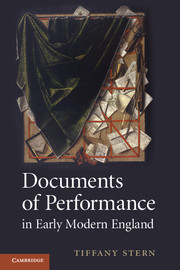Book contents
- Frontmatter
- Contents
- Acknowledgements
- Textual note
- Introduction: Playwrights as play-patchers
- 1 Plot-scenarios
- 2 Playbills and title-pages
- 3 ‘Arguments’ in playhouse and book
- 4 Prologues, epilogues, interim entertainments
- 5 Songs and masques
- 6 Scrolls
- 7 Backstage-plots
- 8 The approved ‘book’ and actors' parts
- Conclusion: Repatching the play
- Notes
- Bibliography
- Index
6 - Scrolls
Published online by Cambridge University Press: 18 December 2009
- Frontmatter
- Contents
- Acknowledgements
- Textual note
- Introduction: Playwrights as play-patchers
- 1 Plot-scenarios
- 2 Playbills and title-pages
- 3 ‘Arguments’ in playhouse and book
- 4 Prologues, epilogues, interim entertainments
- 5 Songs and masques
- 6 Scrolls
- 7 Backstage-plots
- 8 The approved ‘book’ and actors' parts
- Conclusion: Repatching the play
- Notes
- Bibliography
- Index
Summary
INTRODUCTION
Before a word of an early modern playbook has even been read, certain sections of its contents already stand out as distinctive. While ‘dialogue’ is generally printed in roman text, and stage-directions and, often, speech-prefixes are generally in italics, there is a separate variety of text printed within the ‘dialogue’ section that may be in large type, in italics, or simply spaced in such a way as to separate it from the words that flank it. This variety of text is – or, rather, these varieties of text are – ‘scrolls’: the papers that are to be delivered onstage, such as letters, proclamations, bills, verses, challenges, schedules, epitaphs, itemised lists, prologues and epilogues (discussed in chapter 4) and songs (discussed in chapter 5).
A typical example can be found in Massinger's Great Duke of Florence in which Lidia ‘Opens the Letter’, then speaks, then reads what she holds in her hand. Here the scroll is in italic type, differentiating it from the dialogue that surrounds it, whilst associating it with the stage-directions, as though its contents, too, will ‘direct’ the actor:
With Eagles eyes will curiously peruse it. Reads the Letter.
Chast Lidia: the favours are so great
On me by you conferr'd, that to intreat
The least addition to 'em, in true sense
May argue me of blushlesse impudence.
How to prevent it, if your goodnesse finde
You save two lives, and me you ever binde,
The honourer of your vertues, Giovanni.- Type
- Chapter
- Information
- Documents of Performance in Early Modern England , pp. 174 - 200Publisher: Cambridge University PressPrint publication year: 2009

